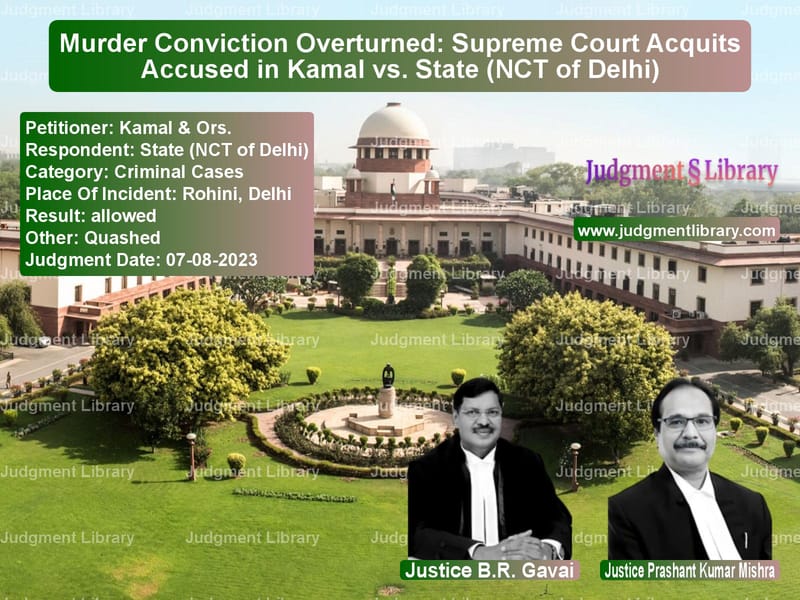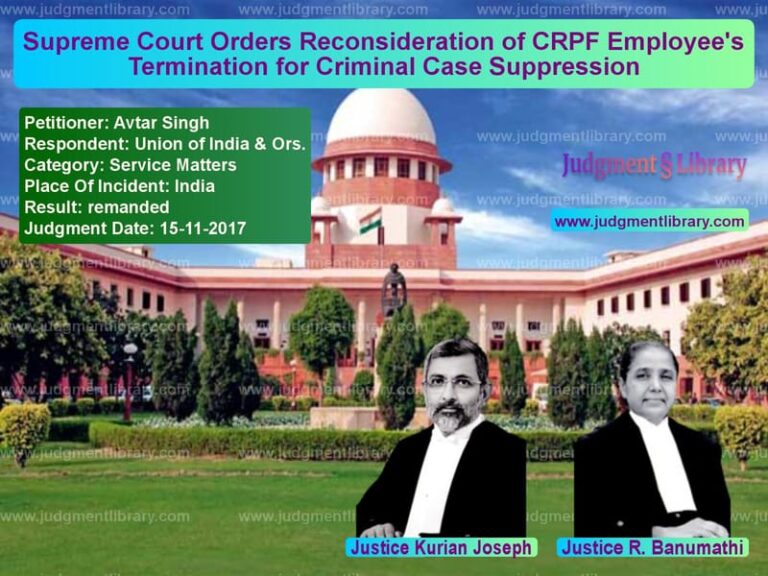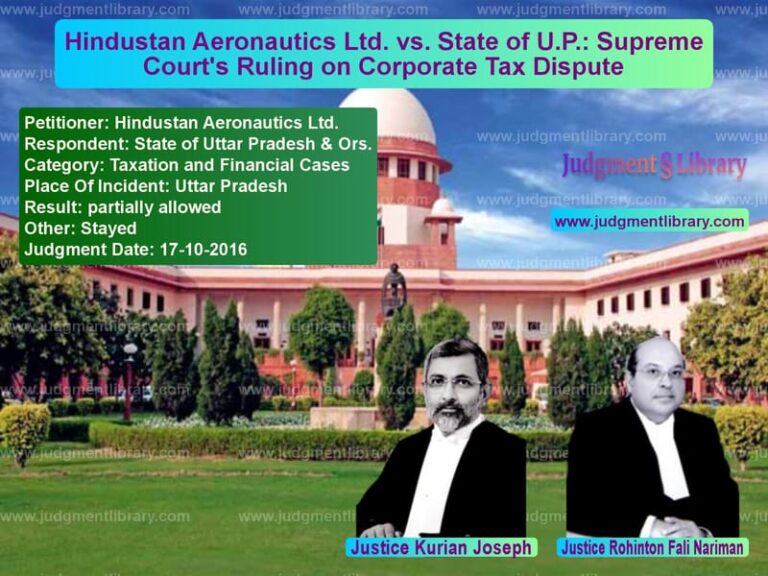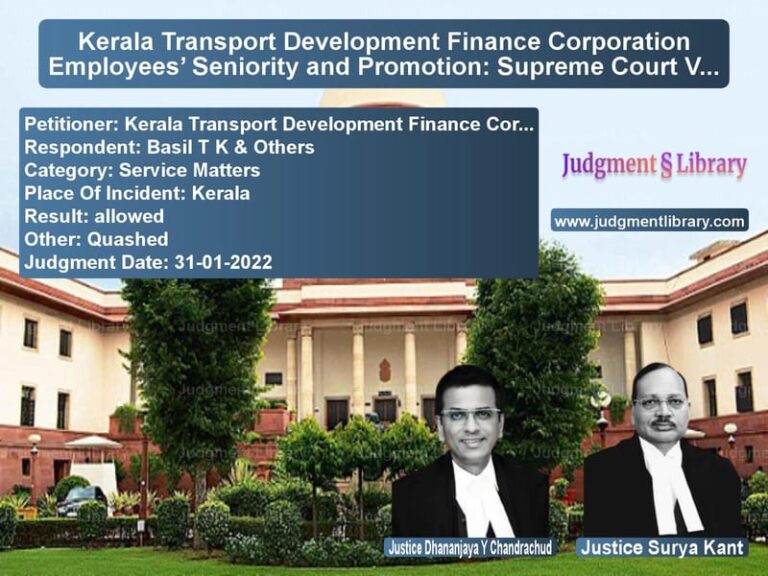Murder Conviction Overturned: Supreme Court Acquits Accused in Kamal vs. State (NCT of Delhi)
The Supreme Court of India recently delivered a significant judgment in Kamal vs. State (NCT of Delhi), overturning the murder conviction of three accused individuals due to lack of conclusive evidence. The judgment, delivered by B.R. Gavai and Prashant Kumar Mishra, emphasized the importance of proving guilt beyond reasonable doubt in circumstantial evidence cases.
This ruling reaffirms fundamental principles of criminal jurisprudence, particularly in cases where the prosecution relies on circumstantial evidence. The Court reiterated that suspicion, no matter how strong, cannot substitute for legal proof.
Background of the Case
The case revolved around the murder of Hoshiyar Singh, who was found dead in his home in Delhi on September 10, 2009. His brother, Surat Singh, discovered the body and reported the matter to the police. An FIR was lodged, initially suspecting the deceased’s son, Prem Singh, due to a long-standing property dispute.
Chronology of Events
- September 10, 2009: Hoshiyar Singh was found dead at his residence.
- September 12, 2009: Prem Singh was arrested and named two associates, Kamal Kishore and Manoj.
- September 16, 2009: The police arrested Kamal Kishore and Manoj.
- May 17, 2013: The trial court convicted all three accused under Section 302 read with Section 34 IPC and sentenced them to life imprisonment.
- August 5, 2014: The Delhi High Court upheld the trial court’s ruling.
- August 7, 2023: The Supreme Court overturned the conviction and acquitted all three accused.
Petitioner’s Arguments
The appellants, represented by Senior Counsel R.K. Kapoor, contended:
- The case was based entirely on circumstantial evidence, without direct proof linking the accused to the murder.
- The prosecution failed to establish an unbroken chain of evidence necessary for conviction.
- The testimony of Jai Singh (PW-20) and Naresh Kumar (PW-21) was unreliable and contradictory.
- The last seen theory was weak, as the witnesses only saw two individuals leaving the scene without identifying them clearly.
- The accused were already shown to witnesses in the police station, making the Test Identification Parade (TIP) meaningless.
- The Call Detail Records (CDRs) provided by the prosecution did not conclusively place the accused at the crime scene.
Respondent’s Arguments
The State (NCT of Delhi), represented by Senior Counsel Sonia Mathur and A.K. Panda, argued:
- The trial court and High Court had properly evaluated the evidence before convicting the accused.
- PW-21 had identified the accused as the individuals leaving the victim’s home.
- The accused had refused to participate in a Test Identification Parade (TIP), which was an adverse inference against them.
- The CDRs confirmed the accused’s presence in the vicinity of the crime scene.
Supreme Court’s Analysis
The Supreme Court ruled in favor of the appellants, holding that the prosecution failed to prove the case beyond reasonable doubt.
1. Flaws in the Last Seen Theory
The Court found inconsistencies in the testimonies of PW-20 and PW-21. It observed:
“The evidence with regard to the last seen theory is totally unreliable. The presence of the accused at the crime scene was not established with certainty.”
2. Unreliability of Test Identification Parade
The Court criticized the reliance on in-court identification when the accused had already been shown to witnesses:
“If the accused are already shown to the witnesses in the police station, then the sanctity of TIP before the court is doubtful.”
3. Lack of Conclusive CDR Evidence
The Court noted that the mobile number attributed to one of the accused belonged to another person and stated:
“No evidence is placed on record to show how the said SIM came to be in possession of the accused Manoj.”
4. Circumstantial Evidence Must Be Conclusive
The Court reiterated the principles laid down in Sharad Birdhichand Sarda v. State of Maharashtra (1984):
- The circumstances must be fully established.
- The evidence must only be consistent with the guilt of the accused.
- There must be a complete chain of evidence that excludes all alternative explanations.
Final Verdict
The Supreme Court ruled:
- The appeals were allowed, and the High Court and trial court judgments were quashed.
- All three accused were acquitted and ordered to be released.
- The Court directed that they be set at liberty unless required in other cases.
This ruling reinforces the principle that circumstantial evidence must establish guilt beyond reasonable doubt. It serves as a reminder that mere suspicion is not sufficient for conviction in criminal cases.
Petitioner Name: Kamal & Ors..Respondent Name: State (NCT of Delhi).Judgment By: Justice B.R. Gavai, Justice Prashant Kumar Mishra.Place Of Incident: Rohini, Delhi.Judgment Date: 07-08-2023.
Don’t miss out on the full details! Download the complete judgment in PDF format below and gain valuable insights instantly!
Download Judgment: kamal-&-ors.-vs-state-(nct-of-delhi)-supreme-court-of-india-judgment-dated-07-08-2023.pdf
Directly Download Judgment: Directly download this Judgment
See all petitions in Murder Cases
See all petitions in Judgment by B R Gavai
See all petitions in Judgment by Prashant Kumar Mishra
See all petitions in allowed
See all petitions in Quashed
See all petitions in supreme court of India judgments August 2023
See all petitions in 2023 judgments
See all posts in Criminal Cases Category
See all allowed petitions in Criminal Cases Category
See all Dismissed petitions in Criminal Cases Category
See all partially allowed petitions in Criminal Cases Category







